Grievances, shocks and injustice loom over the once peaceful fishing village of Pengerang. The fate of the fishermen are draped in uncertainty after impending oil and gas projects threaten the economic livelihood, environment, and even graveyards of the locals. Text and photos by Syukri Syairi.
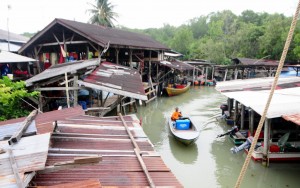
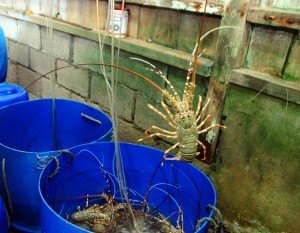 Facing one of the world’s busiest waterways, Pengerang is a rural coastal area in Johor’s southeast. Located two hours away from the state capital by trunk road via Senai, this remote village survived over the years by minding its own business, nonchalant. The locals tend to their lush farms and ply the thriving fishing industry.
Facing one of the world’s busiest waterways, Pengerang is a rural coastal area in Johor’s southeast. Located two hours away from the state capital by trunk road via Senai, this remote village survived over the years by minding its own business, nonchalant. The locals tend to their lush farms and ply the thriving fishing industry.
Shaking this sleepy coastline is the arrival of a chain of petroleum-related projects, initiated by the government’s Economic Transformation Plan, ETP. Notable is RAPID (Refinery and Petrochemical Integrated Development), a RM60.4 billion project by national oil conglomerate Petronas.
Not to be confused with the transport company of the same name, RAPID has a projected refinery capacity of 300,000 barrels of imported crude oil once construction is completed. The project is currently at the land acquisition stage, although it has received the blessings of the Johor BN government and the Sultan.
However, many local residents view the project with suspicion. RAPID insists to acquire an alarming 22,500 acres of land for the complex. This can only mean one thing: everybody must get out, at all costs.
Residents of Pengerang are unnerved. Development, as they once hoped to see it, was supposed to sustain the community. Now, it is set to drive everyone out.
28,000 residents across 17 population centres are set to be evicted. Also affected are quaint local institutions – from farms and orchards, to schools and shops – dating back to hundreds of years.
Old towns, mosques, temples, and graveyards dotting Pengerang’s gorgeous and generous landscape – which could otherwise sustain Pengerang with a much holistic nature of economy – will also be destroyed.
Residents Dissatisfied With Low Compensation
 The issue was first raised in Parliament by DAP Member of Parliament for Bakri, Er Teck Hwa. Er stressed that Pengerang differed from two other controversial projects – the Lynas plant in Kuantan and Raub’s cyanide gold mining operations.
The issue was first raised in Parliament by DAP Member of Parliament for Bakri, Er Teck Hwa. Er stressed that Pengerang differed from two other controversial projects – the Lynas plant in Kuantan and Raub’s cyanide gold mining operations.
“Residents near the Lynas plant and the Raub mine can choose to stay on (and suffer the side effects) but Pengerang fishermen are forced to move away. How will fishermen make a living if they move away from the sea?” Er said.
For many residents, the trust radar is increasingly switching far from positive to negative. Legal recourse for the residents has been fruitless. In August, sudden eviction boomed in urgency.
“There is a lack of transparency in the relocation process,” says Anis Afida Mohd Ali, the chairperson of the Pengerang NGO Coalition, which is an alliance of six NGOs.
Locals are aghast by the garishly low compensation given by the authorities. Residents have been offered a land valuation price of RM2.80 per sq ft as valued by the Kota Tinggi District Land Office.
According to news reports, an independent valuer has put the market price of the land at RM12 per sq ft and RM15 per sq ft. This is presumably due to the fact that the agricultural land will be converted to industrial title in order to build the RAPID project.
As one of the more vocal residents Chua Peng San puts it, the whole matter is spiraling into ‘madness.’
Chua is a small entrepreneur who relies on Pengerang’s fertile soil for his fruit business. He felt strongly affected by Pengerang’s predicament and has become a vocal member of the Pengerang NGO Alliance.
His one-storey single home in Kampung Sungai Rengit, flanked by soaring coconut trees in between the tool sheds in its compound, is now turning into an important place of meeting for the NGO members and concerned residents.
“It’s not a Chinese problem only, it’s also not a Malay problem only,” he tells the Rocket. “People are trying to divide us with this. But it’s not a communal problem. It’s now a problem for everyone here in Pengerang.”
Environmentally Hazardous
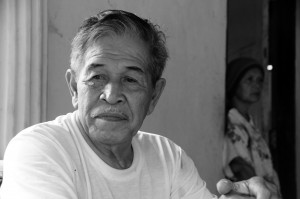
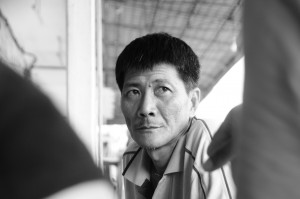 Environmental concerns are the heart of the issue: without the environment, Pengerang residents lose their surroundings, and without their surroundings, their livelihood will be put at risk.
Environmental concerns are the heart of the issue: without the environment, Pengerang residents lose their surroundings, and without their surroundings, their livelihood will be put at risk.
The NGO movement was initially kick-started in February this year with concerns over the environmental impacts that the project would carry. Doubts arose that a hazardous oil refinery that had been rejected by Taiwan, was now being kicked to Malaysian shores.
Apart from RAPID, a RM5 billion deep-water oil terminal commenced construction this year without consulting villagers. The terminal is a joint venture project that the Johor state government has financial interest in.
Total investments for the terminal project are forecasted at a staggering US$40 billion– this, at the bitter expense of the locals.
The terminal disrupted the sea and its surrounding environment, the sole resources of the local fishermen. The seafaring folk have charted severe losses as soon as the reclamation work for the terminal started.
Azalina, where are you?
Pengerang residents are in the dark. Their struggle is tightening, between demanding sufficient compensation through legal means, and preparing themselves in an impromptu exodus they did not even plan on joining.
The demand for clearer (and braver) explanations from the Johor state government continues, with the residents in thirst for a sense of rationality from their elected representatives. Especially from the MP for Pengerang, Dato’ Sri Azalina Othman Said.
It took Taufiq Tahir, acting as Pengerang resident’s representative from the NGO, to send a letter to Azalina on February 8, 2012. He invited her to engage in a session with the affected Pengerang residents. She did not reply.
Azalina and other BN MPs have downplayed the residents’ grouses and dismissed several NGO-led demonstrations as representing ‘only a small fracture of the constituency’.
As the residents are becoming much vocal in sending their message out of Pengerang, Azalina warned the people to ‘not to fall for the tricks from irresponsible parties’, stridently insisting that the project ‘will do good for the future of Pengerang’.
Grave consequences
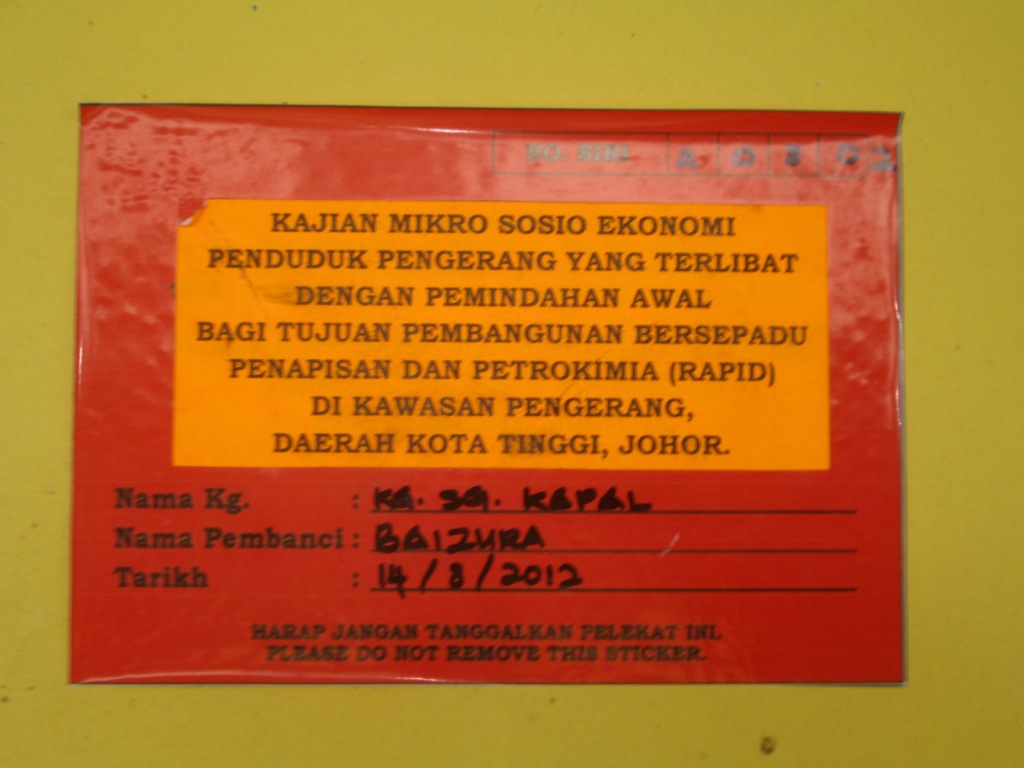
 Two days before the end of Ramadan in mid-August, 35 families in the vicinity of Kampung Sungai Kapal, Kampung Teluk Empang and Kampung Langkah Baik were given a month’s notice to evict. What was supposed to be a jubilant Hari Raya celebration was tainted with uncertainties. Landowner Sulaiman Mohd Salleh is clearly upset.
Two days before the end of Ramadan in mid-August, 35 families in the vicinity of Kampung Sungai Kapal, Kampung Teluk Empang and Kampung Langkah Baik were given a month’s notice to evict. What was supposed to be a jubilant Hari Raya celebration was tainted with uncertainties. Landowner Sulaiman Mohd Salleh is clearly upset.
“This is totally in contrary to the promises made by the Johor Menteri Besar earlier this year, that the project would bring good to Pengerang,” he points out. The glossy news splashed across mass media means nothing to the residents now, who feel they have been tricked.
“He promised that all residents would only be asked to move out once the new houses are finished. But now, what is this?” Sulaiman asks. Officials have suggested for the evicted residents stay with relatives or put up in hotels for the time being. “How easy it is for them to say, when they’re not the ones suffering,” Sulaiman says bitterly.
For the elderly in Pengerang, whose whole lives were dedicated to hard work in both land and sea, they have found their plans to spend their retirement days peacefully, totally disrupted. “They have worked hard so that they could relax now,” Chua explains. “Now they’re facing this, in their final years, having forced out of their homes and their inherited lands.”
For Sulaiman, it’s a no-go. “This is a land awarded by the late Tun Razak for my whole family for agriculture. Look at what they are doing to us, today. No, I will never leave.”
The Pengerang NGO Alliance has been receiving numerous reports from the residents, saying they have been threatened upon their refusal to leave. “They were also warned that their amount of compensation will be lower if they go out and protest openly,” says Taufiq.
False light of hope
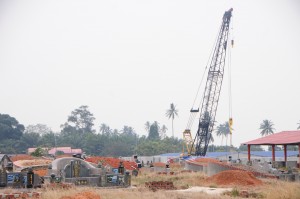 At first, the locals greeted the news of the RAPID and deep-water oil terminal as good prospects. Thinking that it is finally growth knocking right into their doors, they were assured that no one would fall victimised.
At first, the locals greeted the news of the RAPID and deep-water oil terminal as good prospects. Thinking that it is finally growth knocking right into their doors, they were assured that no one would fall victimised.
“The kampung people had all sorts of ideas. They wanted to open up restaurants, home stays – you know, for the workers and visitors,” says a mother, living in Kampung Punggai. “When they know that their land is going to be taken away for the project, they were definitely shocked.”
Kampung Punggai, located about 25km northeast of Pengerang, will provide the new site of the relocated graves affected by the RAPID project. The locals accepted this decision grimly. The projects have been touted to provide more than 40,000 jobs for locals. But the question that residents are asking is a different one: “what jobs?”
“We have been fishermen and farmers for all our lives. How are we ever going to work in a refinery plant?” asks Khoo Kong Heng, a Kampung Sungai Kapal resident. “My wife and I are wondering: how will this improve our lives?”
Locals are foreseeing of the influx of foreign workers; instead of locals getting the jobs – for Sulaiman, this is highly unhealthy. “Pengerang people will only get to enjoy a small part of it, if not none at all,” he says. “The rest will go to workers from the outside. What happens, then, to anak-anak Pengerang?”
For a government that claims to advocate ‘putting people first’, Pengerang is a blot on an already tainted cloth. How does blind profitability get in the way of the interest of the people? Where is the position of the people in the eyes of this government?
As for the residents of this southeastern tip of the peninsula, we hope, better solutions are to land on its shores. – The Rocket



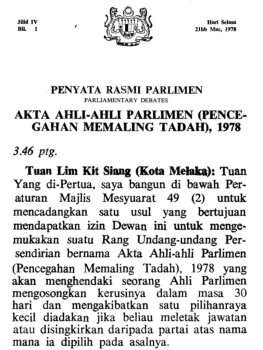
Pingback: The Rocket — Pengerang in photos
Pingback: Why Are The Lobsters Angry? | Pengerang, Sungai Rengit, Johor, Malaysia